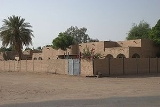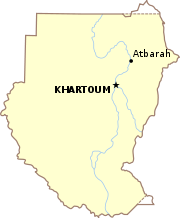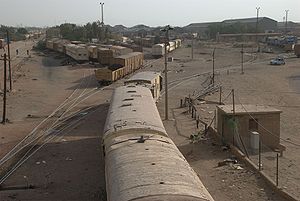
Atbarah
Encyclopedia
Atbarah is a town of 111,399 (2007) located in River Nile State in northeastern Sudan
.
It is located at the junction of the Nile and Atbarah
rivers. It is an important railway junction and railroad manufacturing centre, and most employment in Atbarah is related to the rail lines. It is known as the "Railway City' and The National Railway Company's headquarters are actually located here in Atbarah.
and its most northern tributary, the Atbarah (Bahr-el-Aswad, or Black River) was a strategic location for military operations. In the Battle of Atbara
, fought on the 8 April 1898 near Nakheila, on the north bank of the river, Lord Kitchener
's Anglo-Egyptian army defeated the Mahdi
st forces, commanded by Amir Mahmud Ahmad. Kitchener's strengthened position led to a decisive victory at the Battle of Omdurman
on 2 September 1898, giving the British
control over the Sudan.
The first trade union
in Sudan formed in 1946 among railroad workers in Atbarah. The city also is home to one of Sudan's largest cement factories (Atbara Cement Corporation).
The town was the centre of the Sudanese railway industry. Few trains are made here now and rail traffic is much reduced. The original station and unusual dome-shaped houses of railway workers remain.
Perhaps because of the influence of the railway unions, Atbara is also considered by many to be the home of Sudanese communism. Jaafar Nimeiri, Sudan's president throughout the 1970s, alternated between communism, rabid capitalism and Islamic fundamentalism - depending on who he was trying to get on his side and extract money from - and the communist phase had its stronghold around Atbara.
Atbara is made up of several districts including Umbukole district which has the First Higher School in Atbara. Other districts include the railway district, Almurabaat, Alsawdana and Almatar.
Umbukole was originally the name given to a capital city in a northern state in Kurti county. It is now mostly remembered as the name of a small district in Atbara. A well-known resident is Mandour Almahdi who wrote about the History of the Sudan.
Like Khartoum further upstream, Atbara is also at the confluence of two major rivers.

One of the major districts of Atbara is Al-Dakhla (الداخلة)in Arabic. Some still use the name Al-Dakhla referring to Atbara.

Sudan
Sudan , officially the Republic of the Sudan , is a country in North Africa, sometimes considered part of the Middle East politically. It is bordered by Egypt to the north, the Red Sea to the northeast, Eritrea and Ethiopia to the east, South Sudan to the south, the Central African Republic to the...
.
It is located at the junction of the Nile and Atbarah
Atbarah River
The Atbarah River in northeast Africa rises in northwest Ethiopia, approximately 50 km north of Lake Tana and 30 km west of Gondar. It flows about 805 km to the Nile in north-central Sudan, joining it at the city of Atbarah...
rivers. It is an important railway junction and railroad manufacturing centre, and most employment in Atbarah is related to the rail lines. It is known as the "Railway City' and The National Railway Company's headquarters are actually located here in Atbarah.
History
The confluence of the NileNile
The Nile is a major north-flowing river in North Africa, generally regarded as the longest river in the world. It is long. It runs through the ten countries of Sudan, South Sudan, Burundi, Rwanda, Democratic Republic of the Congo, Tanzania, Kenya, Ethiopia, Uganda and Egypt.The Nile has two major...
and its most northern tributary, the Atbarah (Bahr-el-Aswad, or Black River) was a strategic location for military operations. In the Battle of Atbara
Battle of Atbara
The Battle of Atbara took place during the Second Sudan War. Anglo-Egyptian forces defeated 15,000 Sudanese rebels, called Mahdists or Dervishes. The battle proved to be the turning point in the conquest of Sudan by a British and Egyptian coalition....
, fought on the 8 April 1898 near Nakheila, on the north bank of the river, Lord Kitchener
Herbert Kitchener, 1st Earl Kitchener
Field Marshal Horatio Herbert Kitchener, 1st Earl Kitchener KG, KP, GCB, OM, GCSI, GCMG, GCIE, ADC, PC , was an Irish-born British Field Marshal and proconsul who won fame for his imperial campaigns and later played a central role in the early part of the First World War, although he died halfway...
's Anglo-Egyptian army defeated the Mahdi
Mahdi
In Islamic eschatology, the Mahdi is the prophesied redeemer of Islam who will stay on Earth for seven, nine or nineteen years- before the Day of Judgment and, alongside Jesus, will rid the world of wrongdoing, injustice and tyranny.In Shia Islam, the belief in the Mahdi is a "central religious...
st forces, commanded by Amir Mahmud Ahmad. Kitchener's strengthened position led to a decisive victory at the Battle of Omdurman
Battle of Omdurman
At the Battle of Omdurman , an army commanded by the British Gen. Sir Herbert Kitchener defeated the army of Abdullah al-Taashi, the successor to the self-proclaimed Mahdi Muhammad Ahmad...
on 2 September 1898, giving the British
United Kingdom
The United Kingdom of Great Britain and Northern IrelandIn the United Kingdom and Dependencies, other languages have been officially recognised as legitimate autochthonous languages under the European Charter for Regional or Minority Languages...
control over the Sudan.
The first trade union
Trade union
A trade union, trades union or labor union is an organization of workers that have banded together to achieve common goals such as better working conditions. The trade union, through its leadership, bargains with the employer on behalf of union members and negotiates labour contracts with...
in Sudan formed in 1946 among railroad workers in Atbarah. The city also is home to one of Sudan's largest cement factories (Atbara Cement Corporation).
The town was the centre of the Sudanese railway industry. Few trains are made here now and rail traffic is much reduced. The original station and unusual dome-shaped houses of railway workers remain.
Perhaps because of the influence of the railway unions, Atbara is also considered by many to be the home of Sudanese communism. Jaafar Nimeiri, Sudan's president throughout the 1970s, alternated between communism, rabid capitalism and Islamic fundamentalism - depending on who he was trying to get on his side and extract money from - and the communist phase had its stronghold around Atbara.
Atbara is made up of several districts including Umbukole district which has the First Higher School in Atbara. Other districts include the railway district, Almurabaat, Alsawdana and Almatar.
Umbukole was originally the name given to a capital city in a northern state in Kurti county. It is now mostly remembered as the name of a small district in Atbara. A well-known resident is Mandour Almahdi who wrote about the History of the Sudan.
Like Khartoum further upstream, Atbara is also at the confluence of two major rivers.

Demographics
| Year | Population |
|---|---|
| 1956 | 36.300 |
| 1973 | 66.116 |
| 1983 | 73.009 |
| 1993 | 87.878 |
| 2007 (Estimate) | 111.399 |
One of the major districts of Atbara is Al-Dakhla (الداخلة)in Arabic. Some still use the name Al-Dakhla referring to Atbara.
See also

- EthiopiaEthiopiaEthiopia , officially known as the Federal Democratic Republic of Ethiopia, is a country located in the Horn of Africa. It is the second-most populous nation in Africa, with over 82 million inhabitants, and the tenth-largest by area, occupying 1,100,000 km2...
- border country for the Blue NileBlue NileThe Blue Nile is a river originating at Lake Tana in Ethiopia. With the White Nile, the river is one of the two major tributaries of the Nile...
.

